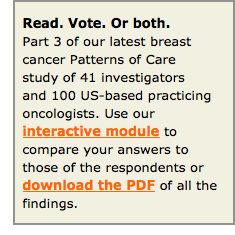

 This third and final segment of our most recent Patterns of Care initiative focuses on one of the most challenging corners of medical oncology, triple-negative metastatic breast cancer (TNMBC) — which went from despair to boundless PARP optimism back to despair with the crushing disappointment of the negative Phase III iniparib trial reported at ASCO last year.
This third and final segment of our most recent Patterns of Care initiative focuses on one of the most challenging corners of medical oncology, triple-negative metastatic breast cancer (TNMBC) — which went from despair to boundless PARP optimism back to despair with the crushing disappointment of the negative Phase III iniparib trial reported at ASCO last year.
For the enclosed survey we asked 41 clinical investigators (CIs) and 100 US-based practicing oncologists (POs) about 4 difficult TNMBC scenarios — age 60 and 75 with and without symptoms — and the findings vividly demonstrate the heterogeneity in treatment decisions. A few issues stand out:
a. Bevacizumab (bev)
As also documented in an international oncologist survey just published in Cancer, although this anti-VEGF agent may be generally unavailable due to reimbursement/regulatory issues, there are many situations in which physicians would choose to use it if they could. This seems to be particularly true for younger patients with symptomatic TNMBC, for whom 58% of CIs and 29% of POs would opt for bev with chemo, usually a taxane.
b. Choice of taxane
Our respondents use docetaxel rather infrequently, likely due to toxicity, and are split almost evenly in the use of nab paclitaxel (nab) and the “standard” version of the agent.
c. Use of capecitabine (cape)
More than a decade after the approval of this oral fluoropyrimidine with a potentially advantageous side-effect profile in the palliative setting, we found that for an asymptomatic 60-year-old woman with newly diagnosed TNMBC who had received an adjuvant anthracycline/taxane regimen, both CIs and POs would most likely resume a taxane (and bev if they could access it) rather than begin with cape, although most patients receive the drug as monotherapy at some point.
Will clinicians have more options for these patients in the near future? Next week the multitudes will again trek to Chicago to find out if any of the new ASCO data sets focused on this patient subset and the related clinical scenario, endocrine-resistant ER-positive, HER2-negative metastatic breast cancer (mBC), have anything beneficial and important to offer. Here are a few that most interest me:
1. Initial results of CALGB-40502 comparing paclitaxel (pac) to nab or ixabepilone (ix) mainly with bev as first-line treatment for mBC (Abstract CRA1002)
We already know from a series of press releases that nab and ix were not superior to pac in terms of efficacy. However, there is great interest in Dr Hope Rugo’s presentation of this first look at the data, including the relative toxicities observed with these agents, particularly neuropathy in the nab and pac arms. The abstract is embargoed, but in the long run perhaps the most valuable data from this ambitious trial might be from tissue correlation studies, and in that regard Dr Rugo is also the discussant of a poster (Abstract 1027) focusing on a 13-gene VEGF signature that appears in patients on the landmark ECOG-E2100 trial of pac/bev demonstrating a survival benefit only in patients with tumors with high expression of that genetic profile (HR = 0.56). This type of treatment predictor could make a major difference in how bev is viewed.
2. Cabozantinib (Abstract 535)
One of my highlights from ASCO 2011 was the surprisingly positive Phase II report in prostate cancer (PCA) with this MET and VEGFR-2 inhibitor formerly known as XL184 with impressive benefits including very dramatic bone scan improvements. A must-see breast cancer poster discussion at ASCO 2012 focuses on a Phase II study of this agent by Dr Eric Winer et al, and the abstract describes objective responses and both clinical and bone scan improvements in patients with bone metastases.
3. Antiandrogens
Approximately 70% of breast cancers express androgen receptors (AR) regardless of ER or HER2 status, and this has sparked an interest in antiandrogens. One upcoming ASCO data set (Abstract 1006) demonstrates no objective responses in 21 patients with AR-positive, ER-negative mBC treated with bicalutamide. Seven patients experienced disease stabilization. Two additional breast cancer reports (Abstracts 3072 and TPS668) focus on an in vitro study and an ongoing Phase I/II trial of the much more potent antiandrogen MDV3100 (enzalutamide), which in PCA is even farther along than cabozantinib, having already demonstrated a survival benefit in a Phase III metastatic trial.
Next….Our final missive before ASCO: Compelling audio and video highlights from our most recent daylong breast cancer clinical investigator Think Tank.
Neil Love, MD
Research To Practice
Miami, Florida